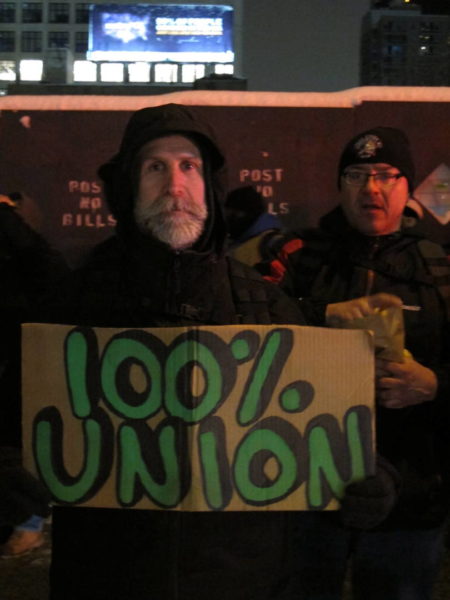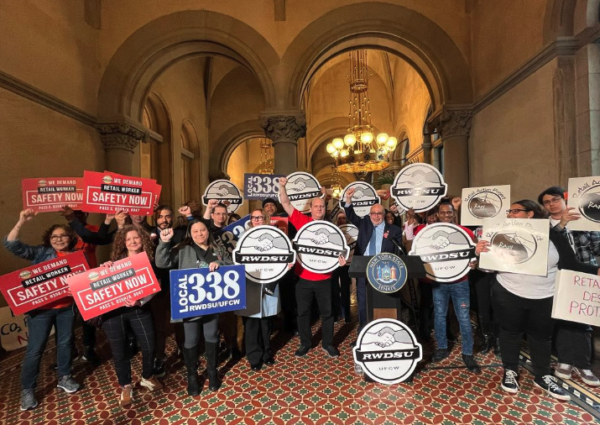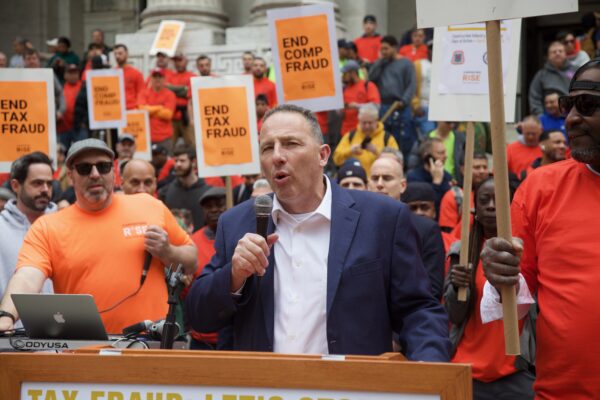NEW YORK, N.Y.—In the cold hour before dawn on Manhattan’s West Side March 22, the previous day’s snow now slush and ice on the sidewalks, construction workers streamed down 34th Street in hooded sweatshirts and well-used work boots, their hands clutching large coffees. About 100 assembled on the northwest corner of Tenth Avenue, across from where the lights of three half-finished Hudson Yards buildings cut through the smoky gray-brown sky.

They were there for the weekly “#CountMeIn” rally protesting the Related Companies’ decision a few months ago to begin using nonunion workers on the second phase of the Hudson Yards project, a so-called “open shop.”
“Can I count you in?” an organizer called out.
“Count me in!” they shouted back.
“Open shop?”
“Broken shop!”
“This is a war, brothers and sisters,” the organizer said. “We will stand up for anyone from an apprentice to Gary LaBarbera.” The Related Companies, he said, are suing the Building and Construction Trades Council of Greater New York for $75 million, and LaBarbera, its president, for $200,000 personally.

“This is the fight for the middle class. I feel like I’m being treated like a criminal because I want decent health insurance,” said Timmy, a 28-year-old member of International Brotherhood of Electrical Workers Local 3 who didn’t want to give his last name. “Guys that are working nonunion, they’re at the mercy of their employer. Bargaining for a wage together gives you a chance for a decent quality of life.”
Nonunion work has been gradually gaining ground in the city’s construction industry for years, but the Related Companies’ move is a major incursion into high-rise construction in Manhattan, which has remained its most solidly union sector.
“I’m not against the nonunion workers. They’re not getting what they deserve,” said Mike Pierro of Glaziers Local 1087. “It’s a $4 billion tower,” he added, pointing across the street, “and they’re building it half nonunion.”
The crowd was smaller than it usually is at the Thursday rallies before the morning shift, some workers said, because of the weather—and, added one late arrival, the subways being screwed up.

If the union shop is weakened, said 34-year-old ironworker Kevin Kelly, it will undermine a whole way of life based on solidarity. His union, Metallic Lathers Local 46, gave him the opportunity to go to college and get two degrees, and has supported him more than anyone outside his family, he said.
“The men and women who built this city deserve a fair and honest wage,” he said, but there is more at stake than money. “The building trades take pride in building something that will last after they’re gone. Everybody wants to see the skyline.” If that’s lost, he added, “it’s going to hurt financially, but it’s also going to hurt emotionally.”
“My goal is to breed solidarity,” said Laborers Local 79 member Justin Badagliacca, 36. “These guys want their employees to live in fear, so they can’t say, ‘I don’t want to do this, it’s unsafe.’”
He doesn’t think Related’s use of nonunion workers is ultimately about money. “I think it’s about control and ego,” he says. “I think they want the title of ‘the guys who took down New York City unions.”
Large developers in New York have traditionally built union, as Related did on the first phase of Hudson Yards. It costs more, but that price buys speed, skill, and safety. But many of the high-rise apartments built in downtown Brooklyn over the last decade were nonunion jobs, and the Boston contractor Gilbane has used open shop on several Manhattan buildings in the last three years.
The pedestrian bridge at Florida International University that killed six people when it collapsed Mar. 15 was being built nonunion, Badagliacca notes. The South Florida Building and Construction Trades Council has described the contractor on that job as hostile to union organizing, according to UCommBlog.
Badagliacca says building-trades workers in other cities are counting on unions here to hold the line, telling him “If New York falls, we all fall.”
“Labor will come back,” he adds. “We will win. This is do or die.”


